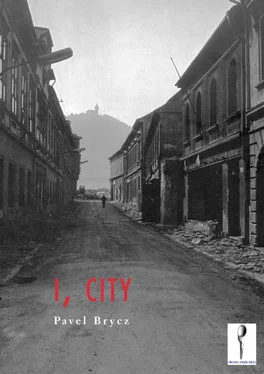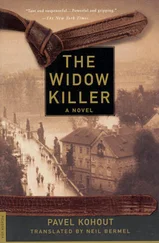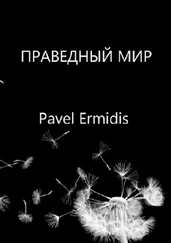Pavel Brycz - I, City
Здесь есть возможность читать онлайн «Pavel Brycz - I, City» весь текст электронной книги совершенно бесплатно (целиком полную версию без сокращений). В некоторых случаях можно слушать аудио, скачать через торрент в формате fb2 и присутствует краткое содержание. Год выпуска: 2006, Издательство: Twisted Spoon Press, Жанр: Современная проза, на английском языке. Описание произведения, (предисловие) а так же отзывы посетителей доступны на портале библиотеки ЛибКат.
- Название:I, City
- Автор:
- Издательство:Twisted Spoon Press
- Жанр:
- Год:2006
- ISBN:нет данных
- Рейтинг книги:5 / 5. Голосов: 1
-
Избранное:Добавить в избранное
- Отзывы:
-
Ваша оценка:
- 100
- 1
- 2
- 3
- 4
- 5
I, City: краткое содержание, описание и аннотация
Предлагаем к чтению аннотацию, описание, краткое содержание или предисловие (зависит от того, что написал сам автор книги «I, City»). Если вы не нашли необходимую информацию о книге — напишите в комментариях, мы постараемся отыскать её.
Dubliners
I, City
I, City — читать онлайн бесплатно полную книгу (весь текст) целиком
Ниже представлен текст книги, разбитый по страницам. Система сохранения места последней прочитанной страницы, позволяет с удобством читать онлайн бесплатно книгу «I, City», без необходимости каждый раз заново искать на чём Вы остановились. Поставьте закладку, и сможете в любой момент перейти на страницу, на которой закончили чтение.
Интервал:
Закладка:
He was doing chores he hated from the depths of his soul and that he, even in a modern marriage, couldn’t ever find justification for. What had happened? The boys of course wouldn’t know, but Mrs. Stankovová herself went to Nina Dimitrova for an answer.
And to her, she apparently revealed her secret.
From that moment on, her husband obeys no longer like a clock, but like a polar bear.
And he has been strictly forbidden from attending the circus for the next fifty years.
AN APPEARANCE, SILENT
Look, up there, as far up as the penultimate floor — the window. They lived together there. Dreamt. You see the window-box — there they nurtured it. You think they had a good crop? Here, amid the apartment blocks?
Don’t be crazy. Even their dreams wilted.
Toward the end they didn’t even sing, he sold the guitar and just lay below the poster of John Lennon, looking at her pacing the room, looking how she didn’t love him anymore, looking how she seemed to want to fly away, how she was suffocated. He looked, and examined the feeling. It was something in A minor that sounded in his soul, but who would’ve taken an interest in it.
Without dreams and without a guitar.
Then she left. She sent a postcard from London.
She took a trip. The second postcard came from Liverpool. John Lennon.
The young man was still picking up his mail then. Not anymore. Look, the mailbox is full.
Paul McCartney, Ringo Starr, George Harrison.
But there was no power able to raise him from his bed.
He lay whole days long, she left him a stereo system and he programmed only one song.
It played through his days and nights, over and over.
It was “Breathing” by Kate Bush. He liked the song very much. Yes, his girlfriend actually looked a lot like Kate Bush.
One day, though, the young man had to get up.
The electrician rang, coming to cut off the electricity. Then the song didn’t sound. The neighbors breathed a sigh of relief. But not for long. One day, the song was heard again from his studio apartment. The young man sang it. It sounded like a mantra:
“Breathing…
breathing… breathing…
breathing… breathing… breathing…
breathing… breathing.”
Understand?
Breathing… breathing… breathing… breathing… over and over again!
AN APPEARANCE, AUTHENTIC
It was in my new chapel, there at the old vocational school, now the city museum, where I first saw him. He was immersed in prayer, the material world ceased to exist for him, and I, city, asked myself, what makes him seem so peculiar to me? Yes, immediately afterward I understood. While the believers were shaking hands at the end of the mass, I realized that he was the only young man there.
All the others in God’s tabernacle were already old relics, on whose yellow, shriveled and tired faces life had inscribed a goodly number of wrinkles. When they kneeled on the hassock and wrung their hands over their prayers, their knees cracked like wood drying for a Stradivarius violin.
The Lord’s Prayer then streamed from their lips like dry leaves drifted away by the wind. They had one leg in the grave and another still at the altar, at least I imagined it that way, and it was a strangely horrific picture for me, like those of Hieronymus Bosch.
The gout, the disease of old legs, washed up on them from the inside, swishing whenever the worms bit into one leg, the other leg held firmly by angels at the altar.
But he was young. He stood with both of his feet on firm ground, or with his knees on the hassock, his face turned to the Lord. His prayers weren’t dead leaves; his prayers were will. Perhaps that’s why God always granted him whatever he asked.
His requests were not small. He wanted to become the richest man in the city. He slept five hours a day and the rest of the time he worked toward fulfilling his dream.
He had his start with the sale of antiques to rich collectors from Germany. Then he discovered that these connoisseurs hungered for old weapons inlaid with gold and silver, the muzzle-loading and breech-loading models from the 18th century, with gun-lock mechanisms, as if they were Prague’s astronomical clocks; so he started to produce them — exact replicas, impossible to differentiate from their older brethren. They knew how to kill, but they were beautiful.
So it is with women: they can kill, but they are beautiful, our young man thought. With the capital from the old icons and rifles, he opened a red-light house with young women. He chose the ladies himself. They can kill, but they’re beautiful.
At that time, the young man had employees. He signed over the salon to one of them and took all the profits for himself. He accepted art- and conservation-school graduates for his historical-weapons workshop, where they refined his wares according to period engravings and illustrations. He moved the antique shop to Prague, where he found a much greater market.
Still, every Sunday he came to my chapel, immersing himself in a world free of money and business, continuing to believe in his God. Whenever someone from the local congregation came to him and asked him for money, providing good reason, he gave it. He was no usurer and was not stingy. God, after all, doesn’t charge interest.
Don’t you believe?
Every Saturday morning you can see him in front of his house washing his Sierra with affectionate care. Stroking it and whispering to it like a lover. How beautiful these cars are. Beautiful, though they can kill. But he was always protected by God. He was protected from the insidiousness of money, too. Millions in the bank never harmed him.
They haven’t even changed him. He still wears his worn jeans and there’s not a ring on any of his fingers.
He despises the boredom of the balls, parties, and happenings; and fortunately the comely debutantes, VIPs, and the intrusive paparazzi of the tabloids don’t go to church.
The only ones there are the tired old people, who protect him from pride, and God, his silent and only companion, who doesn’t disclose anything of the man’s audacious plans to the competition, even though He could, for He knows everything.
AN APPEARANCE, WINDY
I’ve already told you about Till and his walks. Didn’t I? So listen to what happened when Till was nine and met Gustáv Husák, the president of Czechoslovakia.
The president arrived in six hundred and thirteen Tatra 613s, with six-hundred-and-thirteen bigwigs and then commenced a reading of six-hundred-and-thirteen pages of a speech, which was about what six-hundred-and-thirteen comrades had achieved and what fifteen million more would soon achieve. Till was also up on the platform at Windy Square. He was a Young Pioneer with a scarf. The scarf was red and annoying, and Till fidgeted and choked throughout the whole speech until he couldn’t bear it anymore. He untied the scarf with the tips that formed a number one, and because he didn’t know where to put it he hung it up on the microphone of Gustáv Husák, the president. And because President Husák was, after the six hundredth page of his speech, already hoarse, and needed to clear his throat, he inadvertently reached for the red scarf and spit his sputum into it.
“Ah, where did I stop? Yes…” said Gustáv Husák, the president, smiling, as he draped the scarf back over the microphone.
At that moment, Comrade Teacher Tomešová noticed that Till didn’t have a scarf and admonished him.
“Mind your scarf, Till,” she hissed.
But as soon as Till went to reach for the scarf, Gustáv Husák was again seized by breathlessness, and beat the boy to it. When he relieved himself into the scarf again and noticed the confused Till standing between the two authorities — himself and Comrade Teacher — he apologized to the boy, in Slovak: “Sorry, kid, I didn’t notice it was your Pioneer scarf.”
Читать дальшеИнтервал:
Закладка:
Похожие книги на «I, City»
Представляем Вашему вниманию похожие книги на «I, City» списком для выбора. Мы отобрали схожую по названию и смыслу литературу в надежде предоставить читателям больше вариантов отыскать новые, интересные, ещё непрочитанные произведения.
Обсуждение, отзывы о книге «I, City» и просто собственные мнения читателей. Оставьте ваши комментарии, напишите, что Вы думаете о произведении, его смысле или главных героях. Укажите что конкретно понравилось, а что нет, и почему Вы так считаете.












